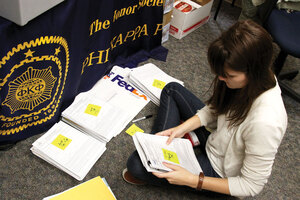Fulbright program sets record for applications at USC
A record number of USC students have submitted applications for the 2010-2011 Fulbright program, which awards grants to students looking to go abroad to teach, learn or perform research.
This year, 63 USC students applied, according to Noosha Malek, USC’s Fulbright Program adviser. That’s 12 more than last year’s total, and more than double the number from just three years ago.

Bright ideas · Melissa Norman, a student worker for Academic Recognition Programs, sorts through the record 63 Fulbright applications sent in by USC students this year. - Mike Lee | Daily Trojan
“Students can do anything from design an independent research project, pursue graduate study at a university, study at a conservatory, produce a documentary or teach English,” Malek said. “As long as the proposed project is academic in nature and specific to the country of application, they can pursue it. That openness is the beauty of the Fulbright program.”
The application process is intense. Applicants must start two months before the deadline, and their proposals undergo heavy review.
Still, USC’s application numbers continue to increase, a rise Malek attributed to USC’s success in the application process. According to the Chronicle of Higher Education, USC was one of last year’s top Fulbright producers, earning eight grants.
“Success breeds success,” Malek said. “Students hear about their peers getting these awards and feel they have a chance too.”
Despite the school’s past success with the Fulbright program, Malek said it’s difficult to estimate how many grants USC will be awarded this year.
“The number does fluctuate,” Malek said. “There are many factors at play.”
The strength of a student’s application is important, Malek said, but sometimes the popularity of the country they are applying to can be just as important.
Last year, 405 students nationwide applied for grants to go to the United Kingdom but only 13 grants were awarded. On the other hand, 54 students applied to go to Korea and 15 received grants.
“The message is not for students to avoid a country because of the numbers, but to be aware that competition is a factor,” Malek said.
Jeanette Acosta, a 2008 USC graduate, applied to the Fulbright Program last year and received a grant to perform research in Mexico.
Acosta said she had known about the Fulbright program for a while, but did not consider it until later in her academic career.
“By the time I was a senior, my friend got a Fulbright,” Acosta said. “Knowing someone made it more tangible and real, I asked myself, ‘Why didn’t I give it a try?’ And it was worth it.”
She is currently in Mexico at the Universidad Autónoma de Zacatecas studying how education among children affects migration.
Jack Tseng, a graduate student working on his Ph.D. in biology, received a Fulbright grant that allowed him to travel to China in 2008 to go to the Chinese Academy of Sciences and do hands-on paleontology work with Chinese fossils.
“I’d always wanted to spend time abroad because it would broaden my education,” Tseng said. “It didn’t come through as a possibility until the Fulbright.”
Unlike most Fulbright grants, Tseng’s wasn’t for a social or political science.
“They don’t usually fund science projects,” Tseng said. “But I really needed to be there to see the material if I wanted to do anything with it. I wouldn’t have been able to do it without the grant.”
Tseng and Acosta agreed applying to the Fulbright Program was the right decision.
“It’s a long process with lots of steps but it’s worth it,” Acosta said. “It’s always worth applying and putting the best application forward if you’re really passionate about something.”
